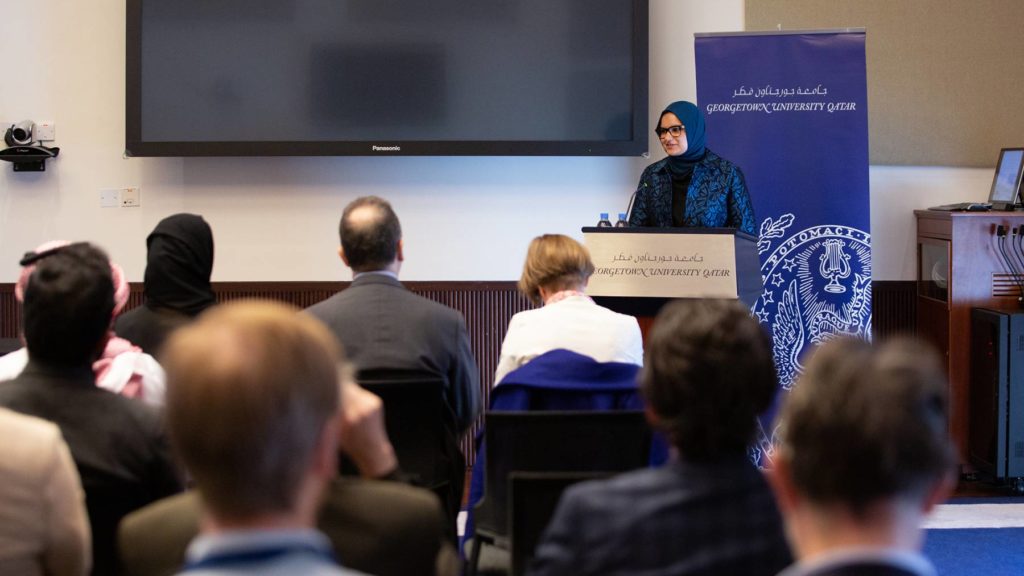Georgetown Research Conference Renews Focus on Islam’s History

Historians and researchers have focused a lot of attention on the Islamic Golden Age, a period of cultural, economic and scientific discovery which placed the Muslim world at the intellectual center of the world. But there has been far less exploration of the historical period that came next. To fill the gaps in this body of knowledge, Georgetown University in Qatar (GU-Q) recently brought together leading scholars involved in research on Islamic intellectual thought between the 16th and 18th centuries at their annual faculty research conference in Doha.
Held under the theme “Transformations and Continuities in Islamic Intellectual Thought,” the 2-day conference focused on the period of history when the Muslim world had separated into three distinct empires: the Safavids, the Ottomans and the Mughals.
The panel of multidisciplinary experts presented research on topics in social and intellectual history, law and politics, reason and ethics, and culture and literature in the Muslim world across these empires. Leading universities from Qatar, the USA, UK, Germany, France, the Netherlands, India, Turkey, Finland, and Sri Lanka took part, along with the British Library.
In his opening remarks at the conference, the dean of GU-Q, Dr. Ahmad Dallal described the literature produced in this time period of Islamic history as “one of the most important legacies of Islamic culture,” challenging widespread beliefs that the era was one of intellectual stagnation.
“Today’s conference has the distinct advantage of providing a comparative approach that questions the notion of decline not only by examining it in different periods and contexts, but also by doing so through the prism of several intellectual and cultural traditions,” he said. The dean, who is also a scholar in Islamic Studies, presented supporting evidence that the post classical period has a “vitality that, at times, is comparable to, and even supersedes in its scope, intensity and quality, the cultural activities of the classical period.”
Conference chair and assistant professor at GU-Q, Dr. Sohaira Siddiqui, noted that while the conference brings together scholars from all disciplinary fields in Islamic thought and participants from different parts of the world, “what connects everyone is a shared interest in questions of historical change, intellectual and cultural production, and scholarly interconnections. We hope that the presentations and conversations stimulate and generate long-term scholarly engagement and collaboration.”
Each year, GU-Q organizes faculty conferences that bring together leading academics and scholars from around the world to encourage an exchange of ideas, provide thoughtful opportunities for engagement with new research for students, and engage local, regional and international audiences.
Conference Videos
Day 1
Keynote Address
Panel 1: Political Thought
Panel 2: Legal Interconnections
Panel 3: Law
Panel 4: Literary Landscapes
Day 2
Panel 5: Scholars and Sultans
- Moderator: Gabor Agoston, Georgetown University
- Abdurrahman Atçıl, Istanbul Şehir University “Comparing Madrasa and University: Administration, Curriculum, and Certification in Madrasa Under the Control of the Ottoman Government”
- Nathan Spannaus, University of Jyvaskyla “The Execution of One Who Goes Against This Creed Becomes Necessary’: Contestation and Orthodoxy in Historical Context”
- Tom Papademetriou, Stockton University “The Intellectual Circle and Influence of Theophilos Korydalleus (1574-1646)”
Panel 6: Intellectual Thought
- Moderator: Reza Pirbhai, Georgetown University in Qatar
- Lejla Demiri, University of Tübingen “Reading Andalusian Poetry in 17th-century Ottoman Damascus”
- Sajjad Rizvi, University of Exeter “Contesting Avicenna in Early Modern Iran and India”
- Charles Ramsey, Baylor University “The Substance of Things Unseen: Shaykh Ahmad Sirhindī, Ṣadr al-Dīn al-Shirazī,and the State of Natural Philosophy in 17th Century Persianate Islam”
Panel 7: Textual Interconnections
- Moderator: Amira El-Zein, Georgetown University in Qatar
- Nur Sobers-Khan, The British Library “Tilsim-i Aja’iband Ta’bir al-Ruya: The Relationship Between Visuality and Text in Bibliomantic Practices in Urdu Divination Manuscripts”
- Asli Niyazioglu, University of Oxford “Ottoman Literary Landscapes and Connected Early Modern: Sixteenth-Century Garden Stories”
- John Perry, University of Chicago “Lexicography as Enabler of Islamic Intellectual Dialogue”